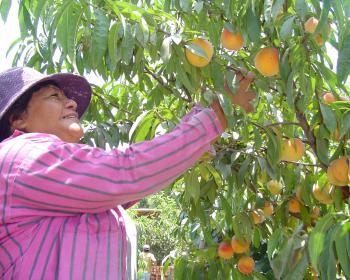United States
APC women’s programme staff in 2009 Photo: APC Join the Association for Progressive Communications Women’s Networking Support Programme in a panel discussion – ‘Take Back the Tech!: Reclaiming Technology for Women’s Rights’. In Lesotho rural women are using cell phones to access prices and form agricultural co-ops. In Colombia and Pakistan survivors of violence and women’s rights organisations are using social networking tools and digital stories to docum...
Can information and communication technologies (ICTs) transform women’s realities? Undoubtedly, yes. This connection between ICTs and the advancement of women’s rights will be addressed during the 55th session of the Commission on the Status of Women (CSW) 22 February – 4 March in New York. The CSW is a global policy-making body of the United Nations dedicated to gender equality and the advancement of women. APC’s GenderIT.org has released a special edition that speaks directly to thi...
Women survivors of domestic violence in Pakistan have long endured twofold abuse – not only at home but by a government that does not protect them. In 2009 there was hope the government would step up to protect women from domestic violence – the National Assembly passed the Domestic Violence (Prevention and Protection) Bill, but the bill expired after the Senate failed to pass it. However,...
APC’s ‘What can you do to end violence against women? Take Back The Tech!’ video is the featured video on the United Nations’ Say NO – UNiTE to End Violence Against Women campaign this week.
“Her story might have daunted me but her strength and courage overwhelmed and even empowered me … I was impressed by how she had taken the bold step of coming forward, taking her life in control and deciding what was best for her,” said Sana Masood in a digital story she created about an acid attack survivor at an APC Feminist Tech Exchange workshop in Pakistan, and which recently won an ...
Activists from cities around the world will meet on-line with Palestinian activists on Saturday, October 30, at 14:00 GMT (16:00 in Bethlehem) a to develop a joint program of educational rights. The workshop is organised by APC member in the US May First/People Link’s part of the World Education Forum being held in Palestine this year. Photo: WEF
Illiteracy, lack of electricity and poor infrastructure are just some of the challenges that are preventing rural women from benefiting from ICTs. But these gender-related challenges are often overlooked by policy makers, and policies that are developed that don’t consider the specific context of rural men and women are more likely to fail, as they will not meet the needs of everyone equally....
APC´s gender and ICT policy site GenderIT.org speaks with Sylvie Niombo and Françoise Mukuku, ICT activists from the Republic of Congo and the Democratic Republic of Congo (DRC). They discuss the internet, mobile phones and how they are being used in their countries to reduce incidence of violence against women and how conversely they aggravate violence and lead to violation of privacy laws....
Freedom of speech and its flipside, access to information, is guaranteed by the First Amendment of the US Constitution. However federally-funded libraries are required to prevent people under eighteen accessing “harmful” content. Kevicha Echols and Melissa Ditmore investigate the use of internet filters on public library computers and find that measures adopted by libraries range from insta...
Smallholders in the desert region of Huaral depend on irrigation cooperatives to water their crops. For ten years one coop association has been developing an information system based on telecentres to help them to make informed agricultural decisions. But the system is being under-utilised and they decided to find what was going wrong. Using APC’s Gender Evaluation Methodology (GEM) they foun...

Association for Progressive Communications (APC) 2022
Unless otherwise stated, content on the APC website is licensed under Creative Commons Attribution 4.0 International (CC BY 4.0)





